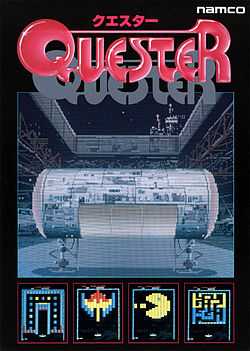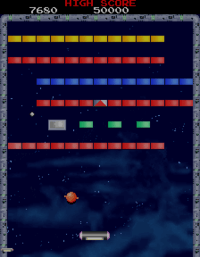Quester
| Quester | |
|---|---|
 Arcade flyer | |
| Developer(s) | Namco |
| Publisher(s) | Namco |
| Designer(s) | Shinji Noguchi |
| Composer(s) | Shinji Hosoe |
| Platform(s) | Arcade, Virtual Console |
| Release date(s) | Arcade
|
| Genre(s) | Breakout clone |
| Mode(s) | Up to 2 players, alternating turns |
| Cabinet | Upright, cabaret, and cocktail |
| Arcade system | Namco System 1 |
| CPU | 2x Motorola M6809 @ 2.048 MHz, 1x Motorola M6809 @ 1.536 MHz, 1x Hitachi HD63701 @ 1.536 MHz |
| Sound | 1x Yamaha YM2151 @ 3.57958 MHz, 1x Namco CUS30 @ 96 kHz, 1x DAC |
| Display | Vertical orientation, Raster, 224 x 288 resolution |
Quester (クエスター Kuesutā) is an arcade game, which was released by Namco in 1987 only in Japan. It runs on Namco System 1 hardware, and represents the company's response to Taito Corporation's Arkanoid (which was released in the previous year); however, its graphics and sound effects are considered superior to both the original Arkanoid video game and its immediate sequel, Revenge of Doh. In 2009, it was re-released under the name of Namco Quester (ナムコクエスター Namuko Kuesutā) on the Virtual Console for the Wii (but the reason for the title change is unknown).
Gameplay

As with many other ball-and-paddle games (including Namco's own Gee Bee trilogy), the player must control a paddle at the bottom of the screen, and move it left and right to deflect a ball into the formation of bricks above it (and, if a player can keep one ball in play for a preset period of time it will split into three balls) - and certain bricks will also leave powerups when destroyed that will increase the size of the paddle, generate several extra balls in a forcefield when the initial ball goes into it and even create a line below the paddle which will prevent the balls from going out of play when collected. The seventh, fourteenth, twenty-first and twenty-eighth rounds are also "bonus rounds", where a player must destroy all the bricks in the formation within a preset time limit (unless all his balls go out of play); the thirty-third and final round is also a "boss round", where a player is against "Burida" (who is protected by a metal wall with a vulnerable spot on its top side, but does not attack by spitting lethal mirrors like Doh did to both Vaus in Arkanoid and the human Bubblun & Bobblun in Rainbow Islands). Once a player has hit that vulnerable spot on the top side of the wall five times, it will leave Burida vulnerable - and once the ball has hit him, the player shall receive 100000 points for every life he has left and the game will be over.
External links
- Quester at the Arcade History database
- Quester guide at StrategyWiki